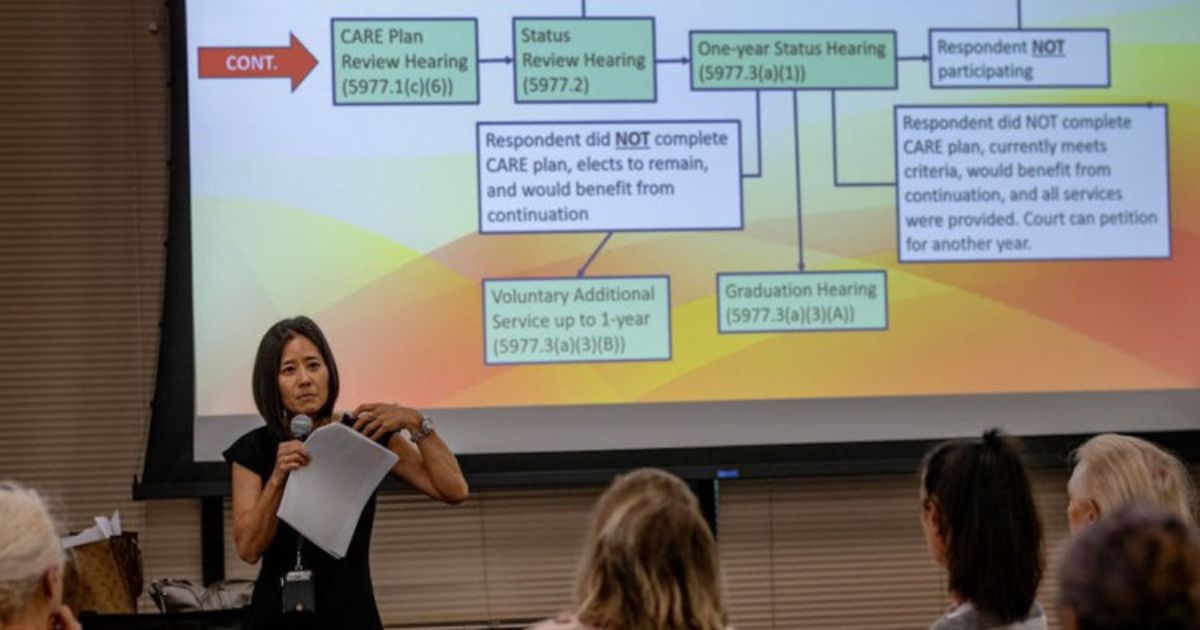California’s CARE Courts represent a bold and contentious step forward in the ongoing struggle to address mental health and homelessness.
Heidi Sweeney’s journey through the labyrinth of mental illness led her to a place where hallucinations dictated her reality. Under the influence of these haunting voices, she sought refuge amidst the vibrant backdrop of Huntington Beach in Orange County, California, believing it to be her sanctuary.
Amidst beachgoers playing volleyball and cruising on their bikes, she slept in homeless encampments and, later, beside a liquor store, attempting to drown out the cacophony of voices that only she could hear with vodka.
For years, Heidi rebuffed offers of assistance, adamantly declaring, “I’m not sick,” to anyone who extended a helping hand. It wasn’t until law enforcement arrested her for petty theft and public drunkenness that she faced an ultimatum from a judge: jail or treatment. Reluctantly, she chose treatment.
Reflecting on that critical juncture, Heidi expressed profound gratitude for the intervention. “I needed that,” she acknowledged. “I think there are others out there who need it too.”
Heidi firmly believes that without the push towards treatment, she might not be alive today, back at work, and reunited with her husband. Her experience underscores the importance of California’s forthcoming civil CARE (Court Assessment Referral and Engagement) Courts, set to launch in eight counties this fall, including San Francisco, Los Angeles, and Orange. The program will expand statewide in 2024.
Under this novel system, family members and first responders gain the authority to petition county judges to mandate treatment for individuals with psychotic illnesses, even if they are not homeless or have not committed a crime.
The judge will then assess whether the individual meets the program’s criteria and may oversee a care agreement or enforce a treatment plan, including involuntary commitment if deemed necessary.
The legislative bill that established this program received overwhelming support in the state legislature last year, reflecting mounting frustration among voters concerning California’s escalating homelessness crisis.
Nevertheless, it encountered fierce opposition from disability rights organizations, which argued that CARE Courts’ core tenet—compelling individuals who have committed no wrongdoing to undergo mental health treatment—constitutes a violation of civil rights.
This tension between those advocating for voluntary treatment and those contending that the status quo condemns individuals to perish on the streets while preserving their civil liberties is a pervasive theme throughout California.
Orange County officials, in particular, face the daunting challenge of persuading individuals to embrace care without resorting to coercion, especially when the nature of their illness convinces them that they are not unwell.
The CARE Court initiative underscores the profound complexities inherent in addressing mental health issues, particularly when individuals with severe psychotic disorders refuse assistance due to their distorted perception of reality.
The program’s aim is to bridge the gap between compassion and coercion, offering a lifeline to those who may not recognize the gravity of their condition or the necessity of treatment.
One of the central tenets of CARE Courts is the inclusion of family members and first responders in the process. Their involvement enables them to intervene when they encounter individuals in crisis, facilitating access to assessment and treatment.
For family members who have watched their loved ones suffer while their pleas for help went unheeded, this program represents a ray of hope.
Critics, however, argue that the program’s foundation in compulsion threatens civil liberties and raises ethical concerns. They contend that the involuntary nature of treatment violates individuals’ rights and autonomy.
Striking a balance between preserving civil liberties and ensuring that those in dire need of care receive it is a formidable challenge, one that will likely continue to spark debates and legal battles.
The program embodies a fundamental question: How can society extend a compassionate hand to individuals who may be unable to recognize their own suffering?
Finding answers to this question will require ongoing dialogue, adaptation, and a commitment to protecting both individual rights and public welfare.


























